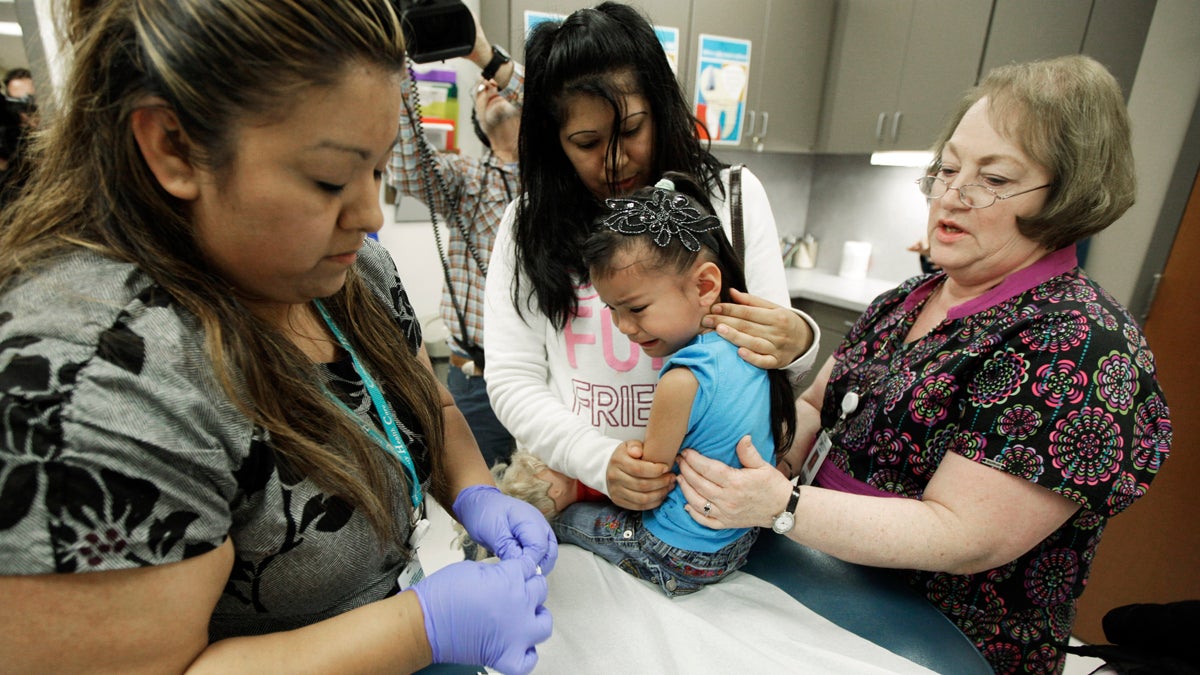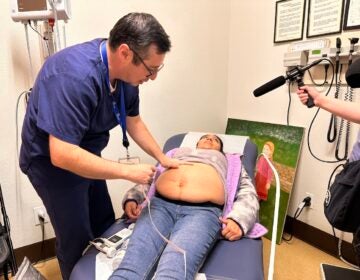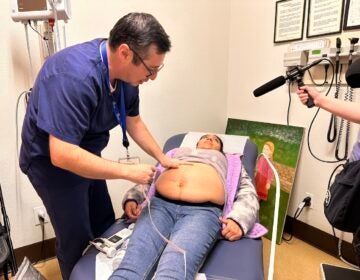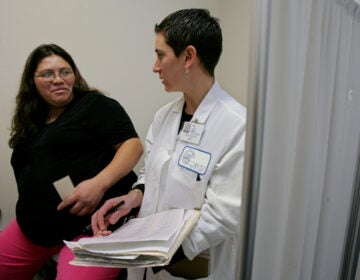Community health center funding included in Thursday congressional vote
Funding officially runs out at the end of March unless Thursday's vote reverses that.

Nurses give a 4-year-old a whooping cough booster shot, as she is held by her mother at a health clinic (Ted S. Warren/AP Photo, file)
Caught up in the middle of the current federal budget debate is the fund for community health centers, which supports the clinics in both rural and urban areas that serve people with little or no insurance.
According to a recent report from Kaiser Health News, 25 million Americans get care from a community health center each year. That fund, according to Jim Willshier at the Pennsylvania Association of Community Health Centers, has always received bipartisan support. But the deadline to renew that funding expired in October.
“Now, here we are in February and we’re still hearing the same thing: that we support health centers,” he said. “I don’t see a reason why this can’t get done, but it hasn’t happened yet.”
Funding officially runs out at the end of March. Willshier said many of the health centers in the statewide network have plans to cut staff and services, if funding is not renewed. He knows of a handful of centers that have already put hiring freezes in place, and at least three that have stalled plans for expansion, due to the uncertainty in funding.
“They can’t wait ‘til midnight on the 31st to say funding’s not going to come through so now we’re going to implement these plans. They need to implement the plans before that happens,” he said.
In Philadelphia, there are 15 operators running 38 community health centers, serving about 300,000 people annually.
One operator is the Family Practice and Counseling Network, a group of five community health centers that offer medical care, behavioral health care, dental care, and preventive services to people, whether or not they are insured.
Donna Torrisi is the executive director of the network, whose budget is $25 million a year. She says about $4 million of that comes from the federal government, and without the fund for health centers, her group would lose $2.5 million a year.
“That’s a lot of salaries,” said Torrisi.
She says that centers like hers are a real lifeline for a lot of people who use them in the same way they might otherwise use the more expensive and less nimble emergency rooms — as a safety net for any and all medical concerns. The difference, though, is health centers can offer some of the wrap-around services that emergency departments can’t.
“If someone is having housing issues, they may not be able to take their insulin,” said Torrisi. “If someone is living with roaches, they may be having more asthma troubles. Community health centers are really there for our patients in ways that Dr. John Doe on the corner is not.”
Torrisi said the network has about 175 staff members and would have to cut at least 20 if they were to lose funding. She worried that behavioral health specialists, and attorneys working on behalf of clients on housing issues, would be among the first to go if they were to lose funding.
“We’d probably get down to the bare basics, you know? Come in and get your blood pressure checked,” she said.
This is not the first time the community health center fund has been at the edge of a funding cliff. The fund was established as a part of the Affordable Care Act to provide increased and more stable funding for health centers for five years. In 2015, funding for both the Children’s Health Insurance Program (CHIP) and community health centers was reauthorized through legislation, called MACRA, extending funding to Sept. 30, 2017.
While CHIP funding reauthorization made it into the last stop-gap bill, money for community health centers did not. The current Senate spending bill includes $7 billion dollars for community health centers over the next two years. The house, where approval of the bill is less than certain, must vote Thursday to prevent a government shutdown.
WHYY is your source for fact-based, in-depth journalism and information. As a nonprofit organization, we rely on financial support from readers like you. Please give today.





